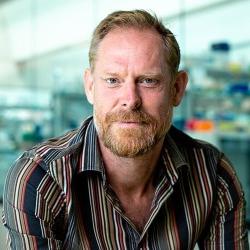Biography
The green revolution brought significant yield improvements for many cereal crops, primarily resulting from the ability to apply nitrogenous fertilisers. However, the predominant beneficiaries of these yield improvements remain wealthy farmers in high-income nations and fertiliser application accounts for a significant proportion of the pollution derived from agriculture. Achieving more equitable and sustainable food production requires an alternative to nitrogen application. Prof Giles Oldroyd studies the mechanisms by which plants form beneficial interactions with micro-organisms, both bacteria and fungi, that aid in the uptake of nutrients from the environment, including nitrogen. The primary aim of this research is to reduce agricultural reliance on inorganic fertilisers and he currently heads an international programme funded by the Bill and Melinda Gates Foundation and the Foreign, Commonwealth and Development Office to engineer nitrogen-fixing crops for the benefit of small-holder farmers in Sub-Saharan Africa. He completed his PhD in 1998 at the University of California Berkeley, USA, studying plant-pathogen interactions and then moved to Stanford University, USA, to work on nitrogen fixation in legumes. He started his independent research programme in 2002 at the John Innes Centre in Norwich, and in 2017 he moved to the Sainsbury Laboratory at the University of Cambridge. In 2019 was elected the Russell R Geiger Professor of Crop Science and Director of the Crop Science Centre, an alliance between the University of Cambridge and the National Institute of Agricultural Botany, focused on recognising agricultural impact from fundamental discoveries in plant sciences. In 2020 he was elected a Fellow of the Royal Society and a member of EMBO as well as elected as a foreign member of the US National Academy of Sciences in 2021.
Research
In our group we aim to understand the signalling and developmental processes in plants that allows interactions with mycorrhizal fungi and nitrogen-fixing bacteria, and to better define the similarities and differences between these two mutualistic associations. The long-term aim of our research is to broaden the plant host species that can accommodate nitrogen-fixing bacteria, in particular cereal crops, utilising the many symbiotic molecular processes that exist in cereals to facilitate mycorrhizal fungal interactions. Nitrogen-fixing cereals have much potential to deliver more sustainable and secure food production systems, with particular potential to deliver significant yield improvements to the poorest farmers in the world.


